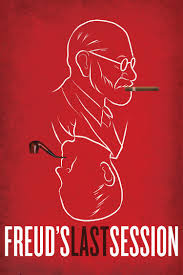When you have the movie theater all to yourself
I didn't love "Freud's Last Session," but I'd forgotten how he died
Last Friday I wandered into the midday screening of “Freud’s Last Session” mostly because it fit my schedule. But there were other reasons, too. First, I appreciate Mark St. Germain’s playwriting prowess and the impact of his art on the cultural landscape in and around the Berkshires. Most of his plays have premiered at Barrington Stage Company in Pittsfield, MA, where he is also a board member.
“Freud’s Last Session” not only premiered there, it became the longest running play at Barrington Stage before moving Off-Broadway, where it played for two years. In other words, I knew the film was based on the play.
The second reason I wanted to see this is quite simple: I firmly believe we are all agnostic, regardless of whether we believe in God or not. As my dad used to say, “never say never, because you never know.”
“Freud’s Last Session” imagines a conversation between Austrian psychoanalyst Sigmund Freud and Oxford professor C. S. Lewis on the existence of God. Notably, this discussion takes place on the eve of World War II in Great Britain, which is about to declare war on Germany.
The two men have completely different world-views. As each tries to convince the other about the existence of God, both know the future of the world hangs in the balance. Air raid sirens have that effect.
Still, the two men share a remarkably intense and deeply personal exchange of ideas. Lewis recounts his combat in World War I through flashbacks, while Freud interprets his own dreams in similar fashion. They talk about religion, family, sex, and politics, among other things.
Despite their lively banter and intellectual gymnastics, I found the whole production somewhat tedious. Of course, when you have the movie theater all to yourself, you feel inherently conflicted. On the one hand, you’re able to focus completely on the film with no distractions at all. On the other, there is something distracting about being all alone in a theater. The former is an ordinary delight, the latter an obscure sorrow.
In any case, the one bright spot here was Anna Freud, someone we hardly know at all. As the founder of child psychoanalysis, I wonder whether she believed in God or not. To believe or not to believe—that is the question. And note to self: must see “Anna Freud: Under Analysis.”
I wish I had liked “Freud’s Last Session” more, because I do like its stars, Anthony Hopkins and Matthew Goode. But it felt claustrophobic, given how much of it took place in Freud’s dark study. If you are in the mood for a film that showcases a different imaginary conversation and also stars Anthony Hopkins, I recommend “The Two Popes,” available on Netflix.
In summary, just as we should never judge a book by its cover, nor should we judge a play by its movie. I so appreciate Mark St. Germain’s plays that I’ve been able to see onstage, notably Typhoid Mary in 2018 and Public Speaking 101 in 2022.
The one I’ve never seen but would clear my schedule for is The God Committee. It tells the story of a hospital transplant committee that has little time to decide which of three patients will receive a life-saving heart. Like “Freud’s Last Session,” “The God Committee” later became a film.
And while I wouldn’t exactly call it a spoiler to describe Freud’s manner of death, I leave it to readers to investigate on your own. Suffice it to say, Sigmund Freud became his own private “God committee.” C. S. Lewis went on to write “The Chronicles of Narnia,” “A Grief Observed,” and “Mere Christianity,” among others. He died on Nov. 22nd, 1963.







